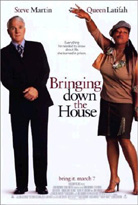Bringing Down the House
| No matter how innocent or revolutionary the final product is meant to be, making comedies about race is always a delicate matter because, in trying to dismantle stereotypes by mocking their very conception, the filmmakers constantly run the risk of reinforcing them simply by trotting them out. Such is the case with Bringing Down the House, an often funny, often uncomfortable comedy that tries to bridge the gap between black and white. but only makes the gulf seem that much wider. Steve Martin stars as Peter Sanderson, an uptight, divorced tax attorney who thinks he’s struck an Internet date with a blonde lady lawyer only to find that his chat buddy is actually a black ex-con named Charlene (Queen Latifah, who also executive produced the film). Charlene is intent that Peter should help her clear her clear her name. “I did the time, but I didn’t do the crime,” she declares the first of many times she shows up at his house. Peter wants nothing to do with this woman, but she is insistent to the point of breaking into his house, throwing a party, and purposefully embarrassing him at his posh country club until he agrees to take on her case. There is plenty of great potential here. For years, Steve Martin has played the role of the anal-retentive straight guy to a series of wacky comedy partners, from John Candy (in the wonderfully hilarious Planes, Trains, and Automobiles), to Goldie Hawn (in the not-as-funny HouseSitter). Pairing him with Queen Latifah is a great idea on paper, but it ultimately fails in execution because the filmmakers don’t allow their relationship to go where it clear wants to go: into romance. Bringing Down the House would be the stereotype-busting racial comedy it wanted to be if it would have had the guts to allow Peter and Charlene to follow through on the romantic-comedy formula in which they’re obviously placed. The film tries to have it both ways by allowing Charlene to pair off with Howie Rosenthal (Eugene Levy), Peter’s friend whose response to first seeing Charlene is, “Go you coco goddess.” The fact that he is constantly referred to as “some kind of freaky” by Charlene himself further undermines the film’s lack of comfort with a black-white romantic pairing. Meanwhile, the plot manufactures ways for Peter to get back with his ex-wife, Kate (Jean Smart), who apparently left him because he works too hard. There isn’t much chemistry between Peter and Kate, and there’s not much between Howie and Charlene either, except in terms of the laughs generated by someone as clearly unhip as Eugene Levy saying with a perfectly straight face, “You got me straight trippin’, boo.” Part of the film’s racial dynamic is mocking elderly white people raised in a different era whose internalized racism is so blatant that it becomes comedic. Bringing Down the House offers not one, but two wealthy white women who fit this bill. The first, played by Betty White, is Peter’s neighbor and also the sister of the senior lawyer in his law firm. You know she’s trouble when she announces early in the film that no Latinos should be in their neighbor unless they’re carrying leaf blowers. Alas, White’s character is never re-educated to appreciate racial others, which cannot be said for Mrs. Arness (Joan Plowright), an uber-wealthy and terse British heiress who Pete is trying to court as a client. She’s just as deeply racist—she even begins singing an old slave song at the dinner table in the movie’s funniest and weirdest moment—but she is redeemed when she winds up in a downtown club smoking weed with a couple of homeboys. Bringing Down the House has its share of laughs, but it clearly aspires to be more, and it is in this respect that it trips itself up. Both Martin and Queen Latifah have great screen presence and they play off each other extremely well, which makes it all the more disappointing that first-time screenwriter Jason Filardi refuses to allow them to take their relationship further. Because in any other movie they would have been paired off in the end, it becomes obvious that race is the issue keeping them separated. In fact, it’s so obvious that it makes the movie somewhat uncomfortable because it’s constantly mocking uptight white people who fear those of a different color, yet the narrative effectively replicates that very sentiment. Copyright © 2003 James Kendrick |
Overall Rating: 
 (2)
(2)


